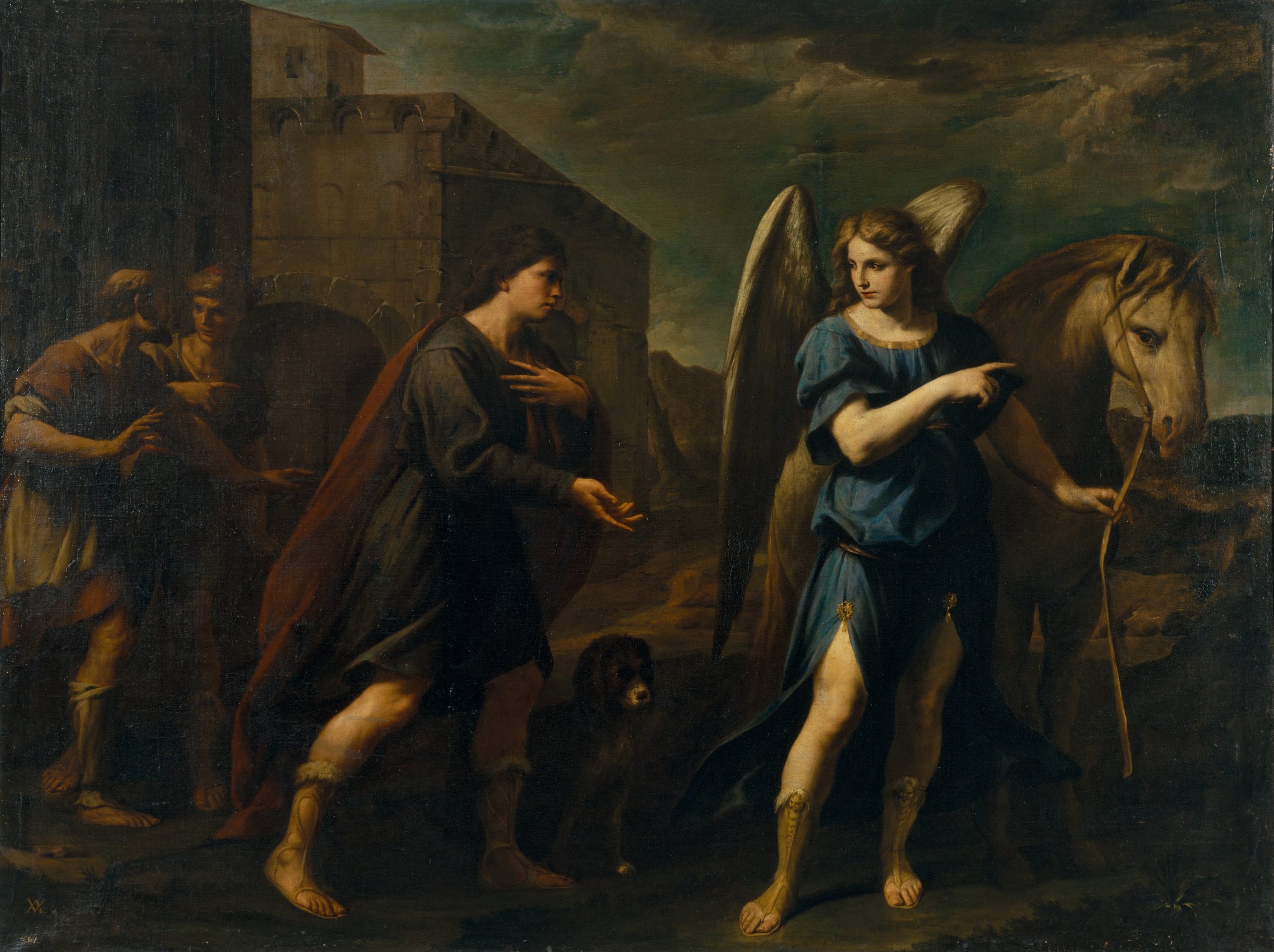By Amber Kinloch
St. Raphael the Archangel
Feast Day: September 29
On September 29th, the Church celebrates the feast of the Archangels Michael, Gabriel, and Raphael. Of the three, St. Raphael seems to be least well known. This is a great pity. Raphael is a major figure in the Book of Tobit, rendering immeasurable help to Tobit and his son Tobiah. Though a great archangel, he can instruct and aid us in many ways.
A Worthy Guide
In Tobit 5, the young Tobiah goes out in search of someone to guide him to Media. There he is to reclaim a large sum of silver from his father’s kinsman Gabael in order to alleviate his family’s pressing need for money. The road to Media is dangerous (Tobit himself ceased to travel it years back), and Tobiah is inexperienced and anxious. Besides, he is his parents’ only child. For them to lose him is unthinkable.
It is then that Raphael appears in the guise of a young man, of kin to Tobiah and Gabael, and familiar with all the different routes leading to Media. Father and son are alike relieved as Raphael assures blind, helpless Tobit that he will bring Tobiah back safe (which he does).
Here is an important reminder that we should turn to the good angels for assistance. Raphael, who took such confident charge of Tobiah, is a particularly powerful intercessor for the young, travelers, and those struggling to find their way forward on the path of holiness. As an angel, his will is far more powerful than ours. The “yes” he gives God is always complete, without any imperfection. Though we are not possessed of such strength, we can ask him to brace us with his prayers when we are vacillating and struggling to embrace God’s Will. It is good, too, to remember that we render him honor when we seek his aid.
God’s Healer
In Chapters 2 and 3 of Tobit, we read about the afflictions of Tobit and his future daughter-in-law Sarah. Tobit suffers from blindness, and Sarah is plagued by a demon. So grievous is their suffering, that they each pray for death. In answer to their prayers, Raphael is sent to help them.
On the journey to Media, Raphael instructs Tobiah in how to make medicine from a fish’s heart, liver, and gall. Later, Tobiah burns the heart and liver to drive away the demon from his new wife Sarah. The gall, likewise, heals Tobiah’s father of his blindness.
These incidents are a fulfillment of Raphael’s special calling to serve as God’s healer. (Raphael’s very name means “God Heals”.) They are an encouragement for us to seek relief through his intercession, whether we suffer from an illness, a temptation, our fears, character defects, or a bad habit.
Let’s not forget our role as healing instruments either. Think not just of the sick, but the lonely, the depressed, or those stuck in a spiritual rut or family conflicts. A bit of our time, some practical help, a listening ear, or some encouragement from us may do wonders to heal their affliction.
God’s Matchmaker
Besides being sent to heal Sarah and Tobit, the Bible says that Raphael was sent “to give Sarah, the daughter of Raguel, as a wife to Tobiah” because he, as her closest kinsman, had a right to marry her before any other (Tob 3:17). When Raphael tells Tobiah this, initially the young man has hesitations. Sarah has already had seven husbands, each of whom was slain by the demon when they approached her. He takes heart, however, when Raphael assures him that all will be well. More than that, Tobiah loves Sarah deeply (though he’s never met her) and has his heart truly set on her (Tob 6:11-18).
Those discerning a vocation to marriage would do well to seek Raphael’s intercession in finding a good future spouse. Furthermore, Raphael can assist us in keeping ourselves pure in body, mind, and heart, no small task in our age. We can also invoke his aid on behalf of our future spouse. This in and of itself is a good first step in cultivating chastity. It orients our heart so that we are seeking our spouse’s good and not just our own satisfaction.
Rectitude in Prayer
Towards the end of Tobit, Raphael reveals his true name, identifying himself as “one of the seven angels who stand and serve before the Glory of the Lord,” where he has presented the prayers of the afflicted Tobit and his future daughter-in-law Sarah (Tob 12:12-15).
During the same encounter, he gives various instructions to Tobit and Tobiah. Foremost among these is the command to “Bless God and give him thanks before all the living for the good things he has done for you…. Proclaim before all with due honor the deeds of God, and do not be slack in thanking him” (Tob 12:6).
His instructions are a strong admonition to us. Too often, we get so fixated on asking God for favors that we forget to give Him the thanks and praise that are always His due. This is no small matter. Intercessory prayer has the focus on us or others. Prayers of praise and thanksgiving, by contrast, are focused on God.
Even in our intercessory prayers, we should take care to keep God at the forefront. Raphael himself tells Tobit and Tobiah, “As for me, when I was with you, I was not acting out of any favor on my part, but by God’s will” (Tob 12:18). He is God’s servant, and in this lies his glory and freedom. Let us imitate him.
St. Raphael, pray for us!

Amber Kinloch
Amber writes from the bunker of her living room. There she hunkers down with her laptop and a blanket while keeping an eye and ear tuned in to the activity of family life. Music set on loop keeps her energy flowing as she muses on the deeper happenings of ordinary life and what food to restock the fridge with.






0 Comments